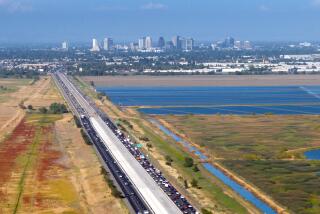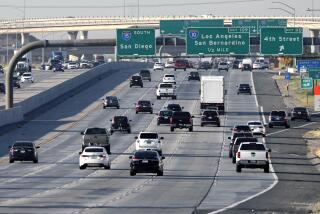City Craves a Canadian Mainline
- Share via
CALAIS, Maine — This town is tired of teetering on the edge of America. Tourists don’t visit, logging is down, boat-building is dead, fishing is bad. Even smuggling is harder.
With its boarded-up buildings in the heart of downtown, with its double-digit jobless rate that is the worst in the state, Calais sits in the midst of what Mainers call the Appalachia of the Atlantic. Even the local tourism slogan reflects a hangdog mentality: “Washington County--Just off the beaten path.”
Just a block away lies Canada, more specifically St. Stephen, infuriatingly more vibrant, maddeningly more interesting. Trade beckons, tourism rocks. St. Stephen is clearly part of the Canadian economy, while Calais is just as clearly cut off from its country. People from there hardly shop here any more, another sign that something is seriously wrong.
“We have a population that is essentially waiting for something to happen,” said a wistful Ferguson Calder, editor of the Calais Advertiser, the 162-year-old weekly newspaper.
That something, they hope, is just down the road. In fact, it is a road. It is a superhighway, a four-lane fantasy that would connect one part of Canada with another by cutting straight across northern Maine, starting with Calais. People here believe it would take one of the poorest regions in the Northeast and put it where it belongs, at least economically: inside the foreign country that virtually surrounds it.
Calais (pronounced “callous”) is one of hundreds of communities desperate to climb aboard the freight train of foreign trade. They are members of more than 40 grass-roots coalitions aimed at building, upgrading, expanding or merely designating new superhighways to both Canada and Mexico and, in the process, bringing prosperity to isolated, tumbledown American towns in between.
Though driven in part by pork-barrel politics and interstate trucking interests, the momentum for this latticework of highway proposals is also being fueled by the melancholy dreams of ramshackle cities such as this one, which view a transcontinental route as a lifeline to international trade.
While some political interests are trying to tighten America’s borders, others are determined to erase their piece of the U.S. frontier.
“We’ve always looked south, to Boston,” said Stephen Hornsby, head of the University of Maine’s Canadian-American Center. “And now we’re waking up to the fact that we have Canada to the west and east and north of us. And there is a realization that you really can’t get to these places.”
Which is why Mainers coined the phrase “You can’t get there from here,” something travelers from neighboring New Brunswick hear when they stop to ask directions to Quebec, on the other side of Maine.
“They are looking for the one road that will help them get across. And there isn’t one,” said Vicki Farrell, head of the local Visitor’s Bureau.
Congress Sets Aside $700 Million for Roads
Congress has set aside $700 million in start-up money for corridors and crossings meant to accommodate the surge in commerce wrought by the North American Free Trade Agreement. Dozens of projects are jostling for that money. Texas alone is promoting three big projects that would zigzag from Mexico to Canada, darting strategically through various congressional districts. California is backing a “Southwest Passage” that would link Mexico to Los Angeles ports, roughly following Interstate 10.
Some plans make more sense than others.
“It occurred to a number of people to sort of use NAFTA as a Christmas tree on which to hang their interests in getting new roads,” said Irving Rubin, executive director of the Eastern Border Transportation Coalition, a group of U.S. states and Canadian provinces devoted to open borders. “In many instances, the NAFTA relationship is a little bit thin.”
Paradoxically, while regional coalitions campaign for beelines across borders, anti-immigration forces are seeking to screen the northern boundary as tightly as the one with Mexico. It is reflective of the West’s dichotomous post-Cold War demand for the free flow of goods but not people.
Under new immigration rules mandated by Congress and scheduled to go into effect next year, everyone who passes any U.S. border would have to show extra documentation as part of a more stringent monitoring system. Senators from northern states, who say the rules will chill trade with Canada, have since persuaded their colleagues to exempt Canada’s frontier from rules they insist were meant for Mexico. But the House has refused to follow suit.
“There’s a lot of us on the border, from here to Puget Sound, concerned about this,” Calais City Manager Tim Smith said. “Hordes of Canadians are not trying to stream into the country.”
Environmentalists, meanwhile, are horrified over this explosion of interests coming together to lobby for, say, a superhighway from Virginia to New York, or Texas to Michigan. They say more interstates mean more pollution, more bulldozed wetlands and more lost farmland and forest.
“We’re at the point of figuring out what to do about it,” said Dan Seligman, director of trade-related environmental issues for the San Francisco-based Sierra Club. “There is an alliance of big industry, trucking companies and local construction companies and local land use developers that didn’t exist before.”
Breathtaking Vistas, Deplorable Roads
Nowhere do the issues of immigration, free trade, open borders, local politics and the notion of nationality in the 21st century swirl together more incongruously than in the wilds of northern Maine, a region noted for breathtaking vistas of endless forest and for twisty two-lane roads embroidered with elaborate skid marks.
“We’ve built a road system where you need a vacation once you come off of it,” said Tim Woodcock, a leader in the East-West Highway Coalition and mayor of Bangor, 90 miles west of here.
Woodcock is a former associate counsel for the Iran-Contra hearings and ex-aide to former Maine Sen. William S. Cohen, now the Defense secretary. He knows how to frame the highway issue in the most geopolitical of contexts, placing it in the pantheon of infrastructure breakthroughs like the Erie Canal.
“I think this is where our future lies,” said Woodcock, who can rifle through a Rand-McNally road atlas like a trucker diagnosing a bypass. “In the coming world, the new economic order, you don’t prosper by isolation.”
But state officials have been reluctant to endorse a new highway, preferring to spend what little money there is on patching what’s already there. Under pressure from increasingly vocal members from the north, the Legislature has authorized highway officials to complete a comprehensive study by January. The state’s largest newspapers also have endorsed the idea.
Nowhere is the highway more coveted than in Calais, a city of 5,000 that considers itself merely the other half of St. Stephen. The towns sit on opposite sides of the St. Croix River, not far from the Atlantic, and share four centuries of bittersweet, boom-and-bust history that has defied national allegiances.
Even efforts to get them to fight each other during the War of 1812 failed. Instead, the British subjects of St. Stephen gave the residents of Calais gunpowder so they could celebrate the Fourth of July with fireworks. During the 1870s, they rebuilt each other after their towns took turns getting burned down.
Today, at Christmastime, people from both towns stand on the opposing banks of the tumbling St. Croix and serenade each other with carols. During International Day in August, they link arms across a tiny bridge in tribute to their unity. Even the fire departments race to each other’s alarms.
Ann Brackett, a Calais schoolteacher, has her hair done in St. Stephen and subscribes to a Canadian Internet provider. She has to clear Customs to attend church each Sunday because her Anglican denomination is based over the border. One of her daughters got married in that church--to a Canadian--and another, killed in a car accident, is buried in its cemetery.
She applied for a job at the U.S. Customs Service, and when she got to the question about whether she had ever visited a foreign country, she wrote that she hadn’t. A Customs official reminded her that daily trips to St. Stephen do, indeed, constitute trips abroad.
“We have such a good feeling for each other that we get so upset when the government gets involved,” she said.
Some people believe that meddling by the federal, state and provincial governments is finally starting to undermine the relationship between the two towns.
Calais Mayor Mike Sherrard said the devaluation of the Canadian dollar and provincial taxes imposed on goods purchased in the United States have shut down one out of every five businesses in Calais in the past few years. His wife’s Radio Shack has seen its Canadian clientele drop from 70% to 15%.
He said Canadian border guards will close lanes and conduct unnecessarily thorough searches in order to make a shopping trip abroad excruciatingly slow.
“They’re harassing their own citizens for taking our goods across,” he said.
Other locals say the American border controls are even more of a hindrance. Newspaper editor Calder and his wife recently were pulled over and interrogated because they happened to have purchased a certain bean-filled doll in Canada.
“They asked if we had anything to declare,” Calder said. “And I said, ‘Yeah, a Beanie Baby.’ They said, ‘You have to go inside.’ ”
Even though his wife bought it for their youngest daughter, Calder said they had to declare that they were keeping it for themselves, not buying it as a gift.
Nothing irritated the locals more than an incident that took place in 1993, when an American man was taking his Canadian girlfriend across the border. Not only did the Canadian customs guards spoil a surprise by confiscating the diamond engagement ring he planned to spring on the woman, they demanded tariffs and taxes worth half its value. Only after a week of embarrassing news coverage did the authorities give the ring back, free of charge.
Bristling at Border Controls
One of the reasons why people here bristle at border controls is, they admit, somewhat larcenous. Smuggling has always been at the heart of the relationship between these towns, which used to funnel British tea to Boston. During Maine’s various experiments with Prohibition, women used to hide booze in their bustles when crossing the border. Buildings on the waterfront still have trap doors in the floors that can be opened to a boat below.
“We have a lot of interesting ways,” chuckled St. Stephen historian Doug Dougherty. “That’s our landmark.”
St. Stephen Mayor Allan Gillmor goes to Calais at least once a day. Like many Canadians, he keeps a post office box in the United States for reasons he wouldn’t expand upon, though there are certain tax advantages to having a U.S. address when accessing the U.S. mail-order economy. And many people of mixed nationality keep a Canadian citizenship solely to remain eligible for free government health care.
People here reminisce warmly about the things smuggled as children, such as hard-to-find margarine. When Gillmor married a woman from out of town, he said she initially felt incredibly guilty when the future mayor would hide something in his car to avoid tariffs at the border.
“I feel guilty if I don’t have anything,” he said, laughing. “It makes life fun. Of course, there is much less of that right now. Big Brother is watching more and more.”
Sherrard was incensed when federal agents a few years ago helped Canadian authorities bust Calais businesses that were selling cigarettes to people who subsequently smuggled them to Canada. “Our own FBI comes down here and helps the Canadians catch our own people. They were selling a perfectly legal product,” he fumed.
A Spirited Rivalry Across the Border
The border hassles are only part of the list of irritants. The two sides have been squabbling over where to put a third bridge that would link their respective highways. And Calais is finally getting its own drinking water after buying it from St. Stephen since 1906 (Calais says the water is impure; St. Stephen insists Calais’ old pipes are the culprit).
Gillmor said there always has been a spirited rivalry between the two towns, but it’s become one-sided. St. Stephen is doing pretty well. It hired a Halifax development consultant, which promptly turned the town chocolate factory into a tourist attraction and made suggestions for sprucing up the waterfront. While ghostly Calais has no discernible pulse, St. Stephen bustles with visitors and exudes an offbeat European charm. Calais has since hired the same Halifax firm.
“We’ve gone through these periods before,” said Sherrard, who was born in St. Stephen in the days when the towns shared a hospital. “Back in the 1980s, St. Stephen’s had the boarded-up stores downtown.”
Not any more. “We’re winning right now,” Gillmor said.
St. Stephen, after all, is in the heart of eastern Canada, while Calais is somewhere off on the edge of a different map entirely, reachable only by bad road. Which is why both sides consider the highway imperative. It is, they believe, something that would not only stitch together two big pieces of two big places, but a couple of little ones as well.
“I’d like to see them do away with the border crossing altogether,” said Sherrard.
More to Read
Sign up for Essential California
The most important California stories and recommendations in your inbox every morning.
You may occasionally receive promotional content from the Los Angeles Times.










